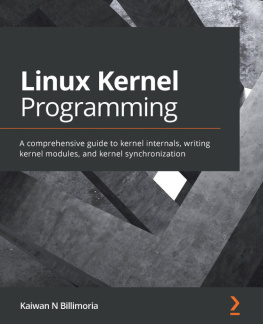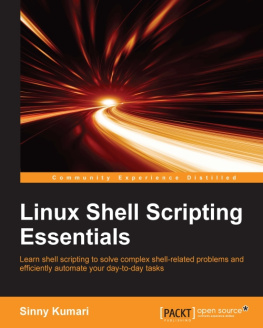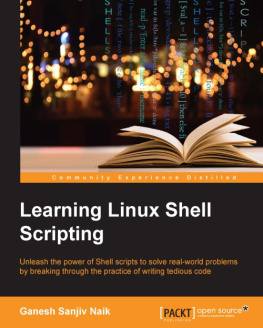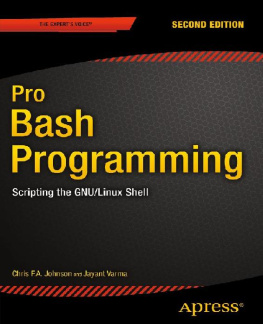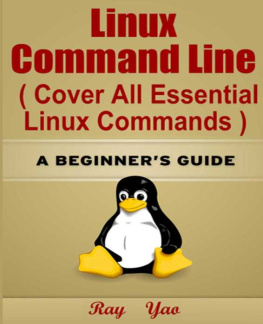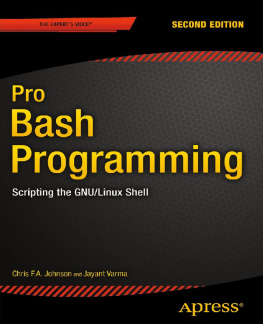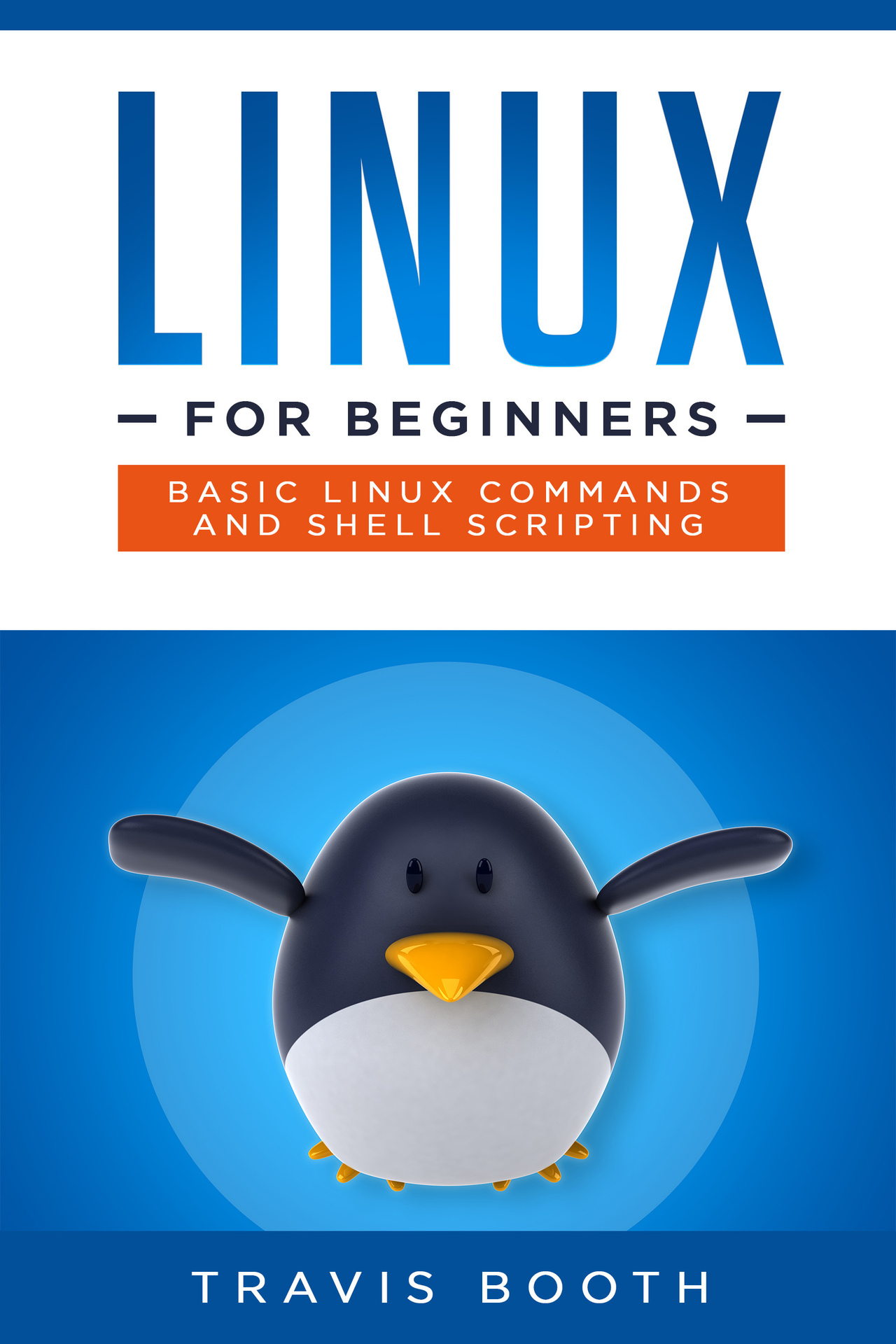Linux for Beginners
Basic Linux Commands and Shell Scripting
Travis Booth
Copyright 2019 - All rights reserved.
The content contained within this book may not be reproduced, duplicated or transmitted without direct written permission from the author or the publisher.
Under no circumstances will any blame or legal responsibility be held against the publisher, or author, for any damages, reparation, or monetary loss due to the information contained within this book. Either directly or indirectly.
Legal Notice:
This book is copyright protected. This book is only for personal use. You cannot amend, distribute, sell, use, quote or paraphrase any part, or the content within this book, without the consent of the author or publisher.
Disclaimer Notice:
Please note the information contained within this document is for educational and entertainment purposes only. All effort has been executed to present accurate, up to date, and reliable, complete information. No warranties of any kind are declared or implied. Readers acknowledge that the author is not engaging in the rendering of legal, financial, medical or professional advice. The content within this book has been derived from various sources. Please consult a licensed professional before attempting any techniques outlined in this book.
By reading this document, the reader agrees that under no circumstances is the author responsible for any losses, direct or indirect, which are incurred as a result of the use of information contained within this document, including, but not limited to, errors, omissions, or inaccuracies
Other Books by Travis Booth
Deep Learning Series
Deep Learning With Python: A Hands-On Guide for Beginners
Deep Learning With Python: A Comprehensive Guide Beyond the Basics
Python Data Analytics Series
Python Data Analytics: The Beginners Real World Crash Course
Python Data Analytics: A Hands-On Guide Beyond the Basics
Python Data Science Series
Python Data Science: Hands-On Learning for Beginners
Python Data Science: A Hands-On Guide Beyond the Basics
Click Here to Explore Further!
Bonus Offer: Get the Ebook absolutely free when you purchase the paperback via Kindle Matchbook
Content
Introduction
This book contains proven steps and strategies on how to use or migrate to Linux for fun and profit. This is the first in a series of books on Linux. You can learn the basic concepts and applications of Linux from this book: from installation to basic shell scripting. The upcoming books in the series will provide you in depth knowledge of Linux concepts, philosophy and applied knowledge. The book series is well organized to provide you with sufficient knowledge as a beginner to become an advanced Linux user.
Who Should Read this Book?
This book is written in simple technical terms and uses simple examples and explanations so that a user who has zero or minimal experience with Linux can learn what Linux is and how to get started with Linux. The structure of the book is focused on providing step by step instructions and examples with screenshots and clarifications to avoid confusion and ambiguity. The content is targeting not only just for a beginner, but for general computer users, junior administrators and executives who wish to learn or sharpen what they know about Linux and how it is practically used.
How this Books is Organized and be Used
This book guides you through the initial setup of your own Linux system and moves forward with the most needed Linux system administration basics for starters. In the later chapters, it covers more advanced topics including certain system administration principles, theories and practical applications, basic and advanced scripting, and programs such as GAWK. The book is organized in the following way.
- You will learn more about Linux, history, flavors and much more (chapter 1).
- Installing and using your first Linux box and some basic administration (chapter 2).
- Linux user management principles, practical approaches, editors, terminal and console (chapter 3).
- Introduction to Linux commands, file system, and basic administration (chapter 4).
- Linux partition styles, data files, and manipulation with sorting, searching with grep, compressing/de-compressing and archiving (chapter 5).
- Shell scripting prerequisites, such as understanding processes, environment variables, and arrays (chapter 6).
- Command aliases, file descriptors, piles, mathematical operations, advanced structured commands, and examples (chapter 7).
- Introduction to functions, parameters, options, getopt and getopts, reading user input and interactive scripting, advanced functions, libraries, and a complete lesson on GAWK (chapter 8).
Tips, Notes, Caution and Scenarios
The book is designed to have many typographical features to help you get the most information from this book.
Why Linux?
Linux is an open-source operating system or a kernel. It is not only the most popular server operating system, but also the widely used open-source operating system. It was founded by Linus Torvalds in 1991 with the collaboration of GNU. Linux is used to power a multitude of systems. For instance, laptops, computers, smartphones, smart refrigerators and many more. Even though in the beginning, it was only famous in computer programmers, now it is used almost everywhere. Today Linux servers run Google, Facebook and many other well-known services.
Linux is different when compared to other popular clients operating systems such as Windows and Mac OS. Linux is an open-source system while other systems are not. That means users cannot make changes in those operating systems since the user cannot access their source code. But anyone can modify the Linux operating system. This does not mean Linux does not have commercial editions.
Some refer to Linux as a clone of UNIX. UNIX was the foundation of Linux, or technically speaking an inspiration in terms of technology. When considering the core both are similar. Even though Linux is like UNIX it has its unique features. Some of the differences between UNIX and Linux are:
- Linux is very flexible, but UNIX is rigid, hence it cannot be used in any computer.
- Linux offers extensive portability in contrast to Unix.
- Source code of Linux is readily available, but for UNIX is it is not actually the case.
These are the reasons for the foundation of Linux.
A complete Linux system package can be called distribution. This includes the Linux kernel, GNU applications, a desktop environment and applications. There are so many available distributions addressing a plethora of needs. Some of the noteworthy distributions are:
- Linux Mint.
- Ubuntu.








